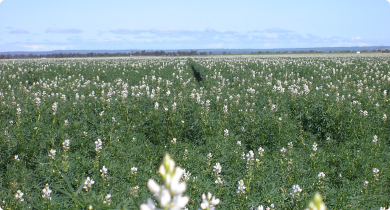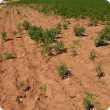Lupins
Western Australia is the world’s largest producer and exporter of lupins with the majority exported as animal feed to the European Union, Japan and Korea – delivering the state about $65 million in export earnings in 2011–12.
Lupins are now being promoted as human food with medical studies confirming their benefits in combating high blood sugar, heart disease and obesity.
Since the release of the first fully domesticated Australian sweet lupin in the late 1960s, lupin breeding by the Department of Primary Industries and Regional Development has resulted in a doubling of lupin yields from 0.7-1.5 tonnes per hectare.
The department supports the pre-breeding, breeding, agronomics and market development of the WA lupins industry, in conjunction with industry partners.


